Inside the Olympics gender row: A banned federation with ties to the Kremlin, unspecified eligibility tests and questions for the IOC, boxing chiefs AND the athletes involved that need answers
Wrapped in an Algerian flag, sweaty and fighting back tears, Imane Khelif shouted to the press in Arabic: “I am a woman.”
The 25-year-old at the heart of the gender battle at the Olympics had just outclassed her Hungarian opponent, winning a unanimous decision that earned her a spot in the semi-finals.
It was in March of last year that Khelif was thrown out of the World Championships in India after allegedly failing a gender test. At the time, it was a decision that barely made the news, but it has now made Khelif and this ring in an innocuous exhibition centre in northern Paris the epicentre of the sporting world.
It is also a decision that requires further investigation.
Here, for at least three rounds, there was no uncertainty about who would be the winner. Khelif defeated Anna Luca Hamori, who had claimed that the fight was unfair in the run-up to the match and had reposted an image of a petite female boxer taking on a horned beast under Olympic rings.
Boxer Imane Khelif (right) defeated Anna Luca Hamori to secure an Olympic medal
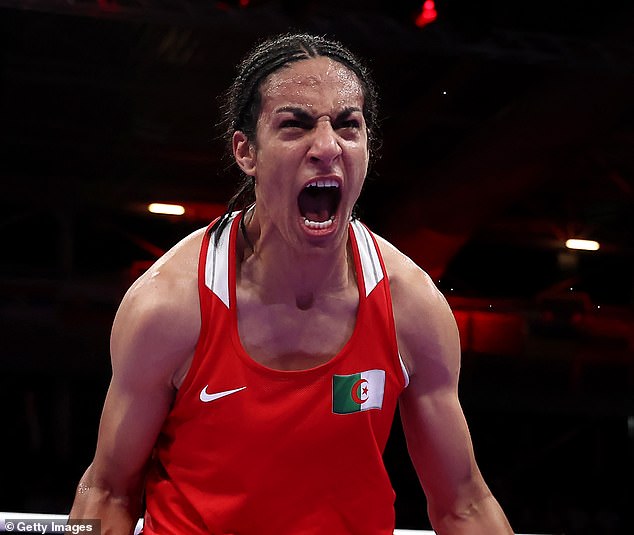
Khelif was kicked out of the World Cup after allegedly failing a gender test
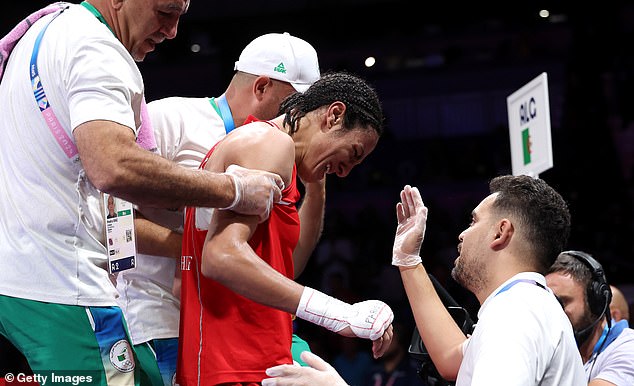
An emotional Khelif shouted ‘I am a woman’ to the press in Arabic after her victory in Paris
From the opening bell, Khelif dictated the pace behind a long jab and a sharp right hand, winning all five rounds on all five scorecards.
Finally, she sank to her knees and emphatically scribbled her name on the blue canvas. She then slowly stood up and blew kisses to all corners before bursting into tears, which continued throughout her interviews and statement.
There are nearly half a million Algerians in France. From the noise that greeted Khelif in and out of the makeshift arena, it sounded as if many of them were here.
Some will use this victory and the manner in which it occurred as further evidence that Khelif should not be here. That men should not be boxing women. It is an argument that cannot be refuted. But what can be questioned is the basis for that claim in this case.
Surprisingly few details about why both Khelif and Taiwan’s Lin Yu-ting, who is also competing in Paris, were disqualified from the tournament in New Delhi are publicly known. There are some facts, however. One is that the decision was made by the IBA, which organized the competition.
Another explanation is that the IBA president is Umar Kremlev, a 41-year-old Moscow man who is outspoken and who posted two tirades about the Games earlier this week, claiming that the opening ceremony was “pure sodomy,” describing IOC chief Thomas Bach as a “sodomite in chief,” and saying that a “pack of hyenas” had defiled the culture.
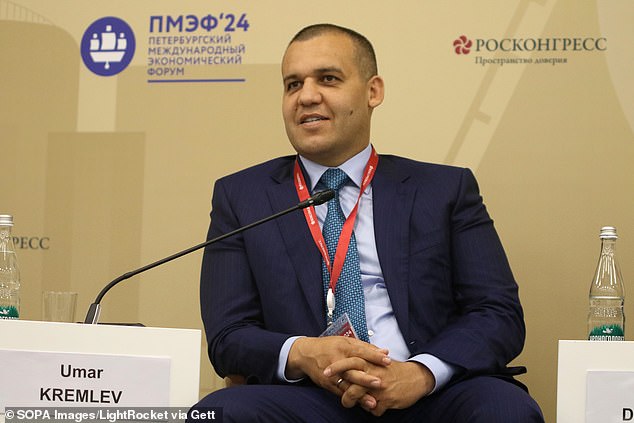
The IBA, led by Umar Kremlev (pictured), was responsible for the decision to disqualify Khelif

IOC President Thomas Bach (above) has defended Khelif’s right to compete in the Olympic Games
Kremlev added that the IBA had excluded “male athletes who boxed as women,” claiming that they had “changed sex.” He is not the most reliable witness in this court of public opinion.
Kremlev’s IBA has not been recognized by the IOC since 2019, when it was suspended over concerns about ethics, refereeing, judging, finance and governance. Among the issues were a sponsorship deal with Russian state energy company Gazprom and questions about the integrity of competitions.
The IBA has been dumped by Britain, the US and others, and last year lost the right to host the Games here. In short, it is not widely seen as a beacon of fair play, and yet its ruling is seen by many as gospel and as powerful ammunition to use in a culture war.
Indeed, there are figures in the boxing world who are not players in this particular fight who are wondering whether the world is once again falling prey to a Russian-led disinformation campaign.
They point out that the decision to test Khelif and Yu-Ting in the Indian capital was taken after Khelif had just defeated Russia’s Azalia Amineva.
They also wonder if the timing of the story resurfacing just before the boxing was a coincidence. If the goal was maximum disruption, then the mission was certainly accomplished.
Answers are needed. What tests were taken and who performed them? Was an independent third party present? What did the results show? Were they verified? Why exactly were the boxers disqualified?
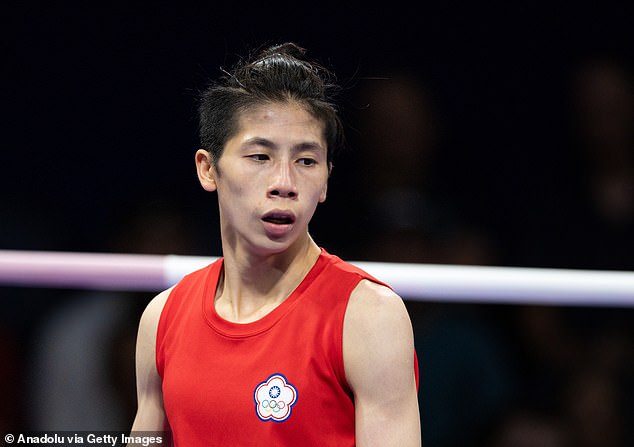
Taiwan’s Lin Yu-Ting is the second boxer to compete at the Games to be embroiled in a gender feud
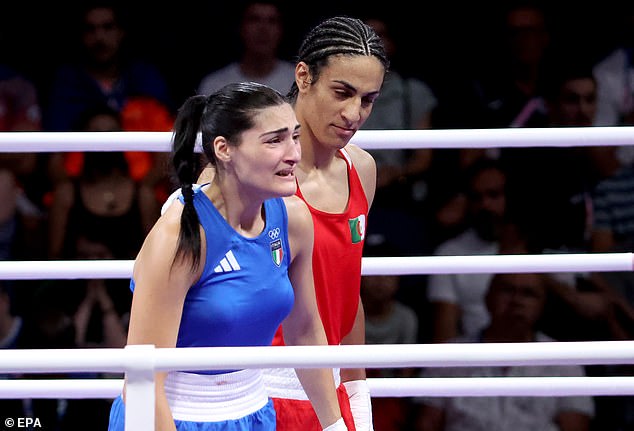
Italy’s Angela Carini (left) withdrew from her fight against Khelif after just 46 seconds
Post Sport I submitted them all to the IBA but got no response, let alone an answer.
Kremlev himself claimed that the tests had shown that both boxers had the male XY chromosome, but he gave no concrete evidence.
As the storm raged as boxing began in France, Italy’s Angela Carini pulled out in tears after just 46 seconds of her fight with Khelif on Thursday, adding fuel to an already raging fire. The IBA, never one to miss a trick, was quick to offer her prize money.
Australian Skye Nicholson, who turned pro after Tokyo, called Carini’s actions a “publicity stunt”.
“They were born as women,” she said of Khelif and Yu-Ting, both of whom she fought. “They were born with an XY chromosome, which is the male chromosome, but they were born with female bodies, they have the physical characteristics of a woman. These are not natural-born men who decided to call themselves women or identify as women in order to fight women.”
Nicholson’s stance will be welcomed by Bach’s IOC, which has promised that once there is consensus on a test format, it will try to implement it. However, since the IBA was disbanded, little appears to have been done to change this.
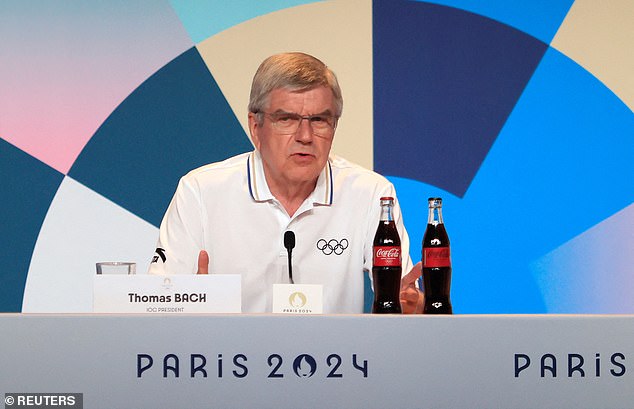
Bach made an embarrassing blunder when he said at a press conference that this was “not a DSD (disorders of sex development) case.” IOC officials quickly clarified, saying he had misspoken
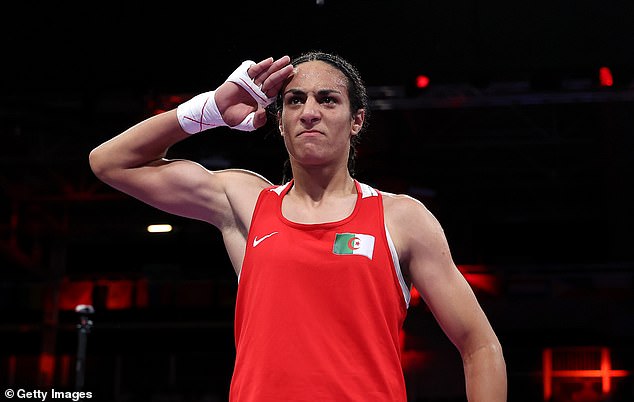
Khelif is now just two wins away from the gold medal – but this story won’t go away
Instead, we are repeatedly told that Khelif and Yu-Ting qualify because their passports say “female” and that this is the most important criterion. It is not good enough and neither is the explanation behind it.
The IOC has also argued that we should not return to the ‘archaic’ world of sex testing. However, sex testing has previously been carried out in the form of a simple cheek swab. A survey of female athletes at the 1996 Games found that 82 per cent wanted the test to continue, while 94 per cent said it did not make them feel anxious. And yet the test was scrapped for Sydney. Why?
There are also questions for the athletes themselves. Khelif claimed the IBA had bullied him after the disqualification, but subsequently withdrew an appeal to the Court of Arbitration for Sport, which the IBA said made the decision legally binding. Yu-Ting did not appeal. Both were able to agree to a gender test and end the debate in a matter of minutes.
Khelif now heads to Roland Garros. She is two wins away from gold and is assured of a medal. This time she hopes to keep it.
